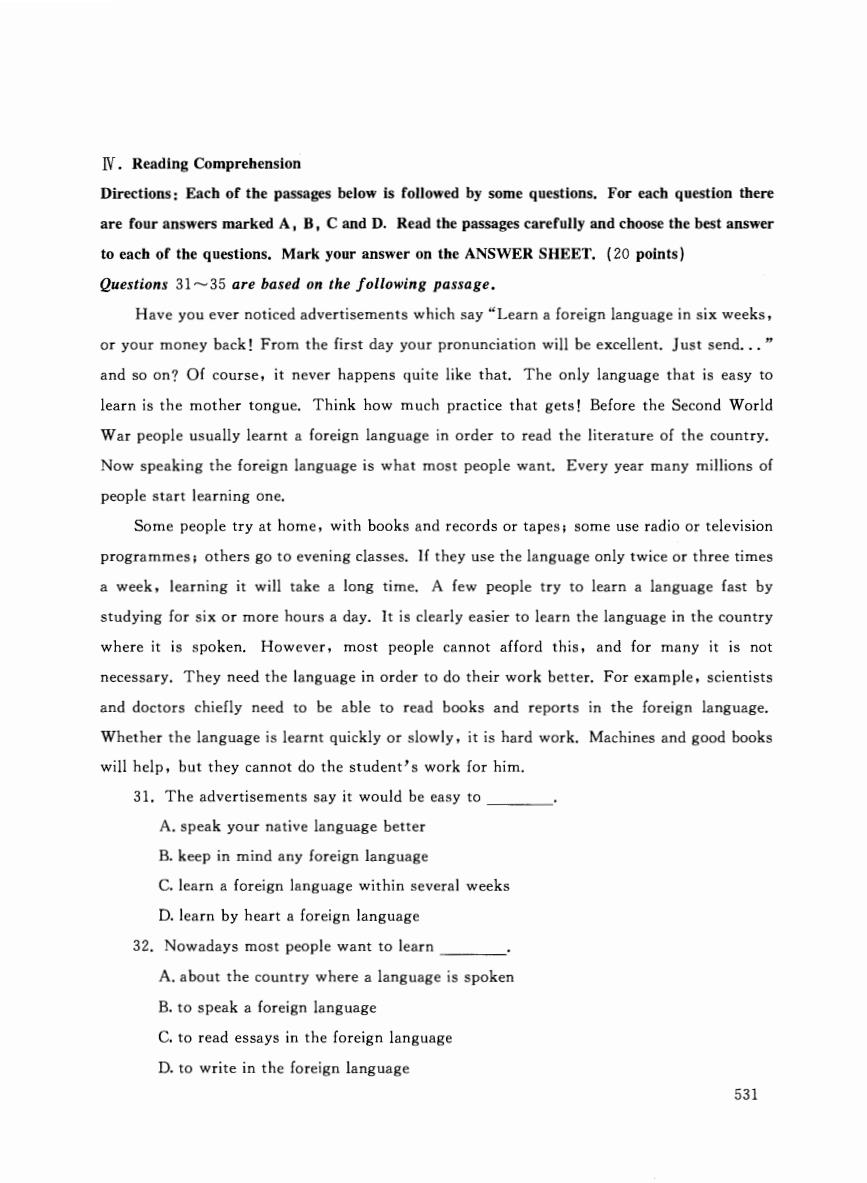正在加载图片...

IV.Reading Comprehension Directions:Each of the passages below is followed by some questions.For each question there are four answers marked A,B,C and D.Read the passages carefully and choose the best answer to each of the questions.Mark your answer on the ANSWER SHEET.(20 points) Questions 31~35 are based on the following passage. Have you ever noticed advertisements which say "Learn a foreign language in six weeks, or your money back!From the first day your pronunciation will be excellent.Just send..." and so on?Of course,it never happens quite like that.The only language that is easy to learn is the mother tongue.Think how much practice that gets!Before the Second World War people usually learnt a foreign language in order to read the literature of the country. Now speaking the foreign language is what most people want.Every year many millions of people start learning one. Some people try at home,with books and records or tapes;some use radio or television programmes;others go to evening classes.If they use the language only twice or three times a week,learning it will take a long time.A few people try to learn a language fast by studying for six or more hours a day.It is clearly easier to learn the language in the country where it is spoken.However,most people cannot afford this,and for many it is not necessary.They need the language in order to do their work better.For example,scientists and doctors chiefly need to be able to read books and reports in the foreign language. Whether the language is learnt quickly or slowly,it is hard work.Machines and good books will help,but they cannot do the student's work for him. 31.The advertisements say it would be easy to A.speak your native language better B.keep in mind any foreign language C.learn a foreign language within several weeks D.learn by heart a foreign language 32.Nowadays most people want to learn A.about the country where a language is spoken B.to speak a foreign language C.to read essays in the foreign language D.to write in the foreign language 531凹. Reading Comprehension Directions: Each of the passages below is followed by some questions. For each question there are four answers marked A I B I C and D. Read the passages carefully and choose the best answer to each of the questions. Mark your answer on the ANS飞厅ER SHEET. (20 points) Questions 31~35 are based on the following passage. Have you ever notic advertisements which say "Learn a foreign language in six weeks, or your money back! From the first day your pronunciation will be excellent. J ust send. . . " and so on? Of course , it never happens quite like that. The only language that is easy to learn is the mother tongue. Think how much practice that gets! Before the Second World War people usually learnt a foreign language in order to read the literature of the country. Now speaking the foreign language is what most people want. Every year many millions of people start learning one. Some people try at home , with books and records or tapes; some use radio or television programmes; others go to evening classes. If they use the language only twice or three times a week , learning it will take a long time. A few people try to learn a language fast by studying for six or more hours a day. It is clearly easier to learn the language in the country where it is spoken. However, most people cannot afford this, and for many it is not necessary. They need the language in order to do their work better. For example , scientists and doctors chiefly need to be able to read books and reports in the foreign language. Whether the language is learnt quickly or slowly , it is hard work. Machines and good books will help , but they cannot do the student' s work for him. 31. The advertisements say it would be easy to 一一一-一· A. speak your native language better B. keep in mind any foreign language C. learn a foreign language within several weeks D. learn by heart a foreign language 32. Nowadays most people want to learn 一一一一一一· A. about the country where a language is spoken B. to speak a foreign language C. to read essays in the foreign language D. to write in the foreign language 531